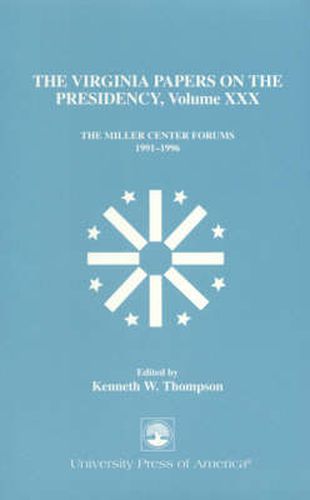Readings Newsletter
Become a Readings Member to make your shopping experience even easier.
Sign in or sign up for free!
You’re not far away from qualifying for FREE standard shipping within Australia
You’ve qualified for FREE standard shipping within Australia
The cart is loading…






This volume explores the dual role of the president-leader of the American people and leader and spokesman for the United States. Part I examines the roles of the president through discussions of presidential leadership at summits, relations between Congress and the president, and the organization of policy-making. In Part II the focus shifts to the role of presidential communication in the international arena. American intervention is analyzed and the role of the U.N. executive committee is considered. The experiences of presidents on crucial domestic issues-education and science-is the theme of Part III. Contributors discuss how presidential policy on these issues influences the nation’s future, both domestically and internationally. Part IV is a case study of the Cuban Missle Crisis that typifies the executive’s role in the international setting, and Part V focuses on public philosophy and how it relates to urgent political problems. The book concludes with observations by the Miller Center’s director on the history of the Center, the Miller Center series, and the contribution of public forums to a free and constructive exchange of ideas.
$9.00 standard shipping within Australia
FREE standard shipping within Australia for orders over $100.00
Express & International shipping calculated at checkout
This volume explores the dual role of the president-leader of the American people and leader and spokesman for the United States. Part I examines the roles of the president through discussions of presidential leadership at summits, relations between Congress and the president, and the organization of policy-making. In Part II the focus shifts to the role of presidential communication in the international arena. American intervention is analyzed and the role of the U.N. executive committee is considered. The experiences of presidents on crucial domestic issues-education and science-is the theme of Part III. Contributors discuss how presidential policy on these issues influences the nation’s future, both domestically and internationally. Part IV is a case study of the Cuban Missle Crisis that typifies the executive’s role in the international setting, and Part V focuses on public philosophy and how it relates to urgent political problems. The book concludes with observations by the Miller Center’s director on the history of the Center, the Miller Center series, and the contribution of public forums to a free and constructive exchange of ideas.